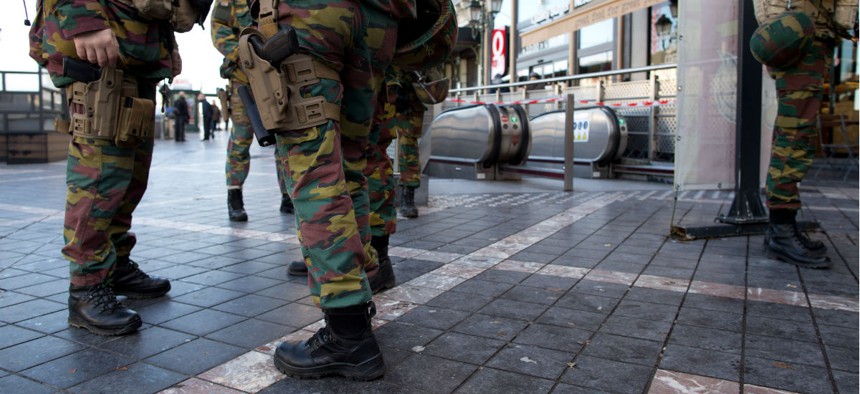
Belgium Army and police at Porte de Namur metro station in Brussels as part of security lock-down following terrorist threats on Nov. 23, 2015. CRM/Shutterstock
VOA’s Extremism Watch Project Fills a Niche in Monitoring Terrorism
Website in English and South Asian languages can claim scoops.
U.S.-backed Kurdish forces battling the Islamic State early this month captured the 850-year-old Jaabar Castle on the Euphrates River near the ISIS stronghold in Raqqa, Syria. On the scene to report exclusive details were sources working with the Voice of America, whose coverage—translated and edited into video back in Washington—delivered a key success to the VOA’s Extremism Watch desk, launched last August after 10 months of planning.
Documenting the deadly attack on a training center ISIS had occupied for two years is what VOA Director Amanda Bennett had envisioned when she announced that “VOA’s Extremism Watch is on the frontlines of investigative reporting.”
The news desk, staffed by nine people who speak 13 languages, trolls for underreported terrorism stories and packages them for sharing with other U.S. government civilian broadcasters—Radio Free Europe/Radio Liberty, the Office of Cuba Broadcasting, Radio Free Asia and the Middle East Broadcasting Networks who work in 47 languages (including English). They help provide in-depth analysis while adhering, VOA stresses, “strictly to the VOA Charter, which mandates accurate, balanced and comprehensive reporting.”
The Extremism Watch desk primarily involves Urdu, Pashto, Turkish and Kurdish, but translating into English and sending out prompts on social media is also giving the VOA more original content and more presence than ever within the United States. Given that Arabic is the primary language of some key terrorist organizations, the desk also includes Arabic speakers and bases some of its content on the “Raise Your Voice” Facebook page from a sister broadcaster more targeted to Arabic-speaking areas, the Springfield, Va.-based Middle East Broadcasting Networks.
“We are part of the South and Central Asia unit, and that’s where all the action is,” said Extremism Watch desk Managing Editor Ernest Torriero, a six-year VOA veteran with a long career reporting domestically and overseas for the Chicago Tribune and the South Florida Sun-Sentinel. “Often in government there are silos. We want to break down those silos as part of good governance to get unique material out to a wider, mainstream audience. The reason we’re able to do what others can’t is that we have people on the ground gathering stuff in their languages. “
VOA is a unique hybrid, Torriero added, with a large English audience but an audience of others who receive its text, audio and video products in their own languages. The desk is needed “to get it into shape so it can be rebranded back,” he says. The capture of the castle, for example, “came into our Kurdish service as a five-minute video—but no one’s going to run five minutes. So we needed someone who speaks the language of [the person] who took the video, select the relevant parts and recut it into a 45-second” item with English subtitles.
The desk then sends it downstairs where it is blasted out on social media to “generate a lot of hits.” The edited version goes back to the services without English subtitles where it goes out in eight languages, among them Kurdish, Turkish, and Urdu. The desk has a link on the VOA home page.
Since planning began, the Extremist Watch desk has created more than 600 products in video audio and Web text (usually 400-500 words), the editor said, including a notable “long narrative story about a well-educated Turk who joined ISIS and was killed last summer, but who left a trail on social media in Turkish that VOA contractors were able to analyze.
The daily routine on the desk begins with a read of the language-specific services, a daily round-up from each region that becomes “our own sourcebook of what the countries’ state or independent media are saying about ISIS,” from Baghdad to Istanbul, Torriero said. “We have a sense very early in the morning, and we see trends before others, things that are not on the wires.”
The team then executes their own stories “based on those tips,” he added, citing another example of fresh global coverage—the desk’s reporting on the increasing use of drones by ISIS, the Turks and the regional militia.
Does the VOA product add to or duplicate the work of the intelligence community? “We have a firewall” that prevents coordination with intelligence agencies, though “they can use it like everyone else,” Torriero said, and they may use the same sources. “As a known entity within the government community, the VOA desk gets more tips than one would think,” he added. “But we do not write propaganda.”
Asked to speculate on changes at VOA under the Trump administration,Torriero said, “We have great added value under any administration and terrorism is not confined to the Obama or Trump administration or any in the European Union,” he said. “It’s a worldwide phenomenon that needs to be continually monitored.”
But the desk itself is “not its own broadcast platform,” he added. “We depend on the rest of VOA to get our stuff out. It’s not designed to build up our own reputation—it’s designed as a bridge to get content onto platforms that bring the most to VOA.”
Image via CRM/Shutterstock, Inc.
NEXT STORY: Trump Signs Order to Freeze Federal Hiring







